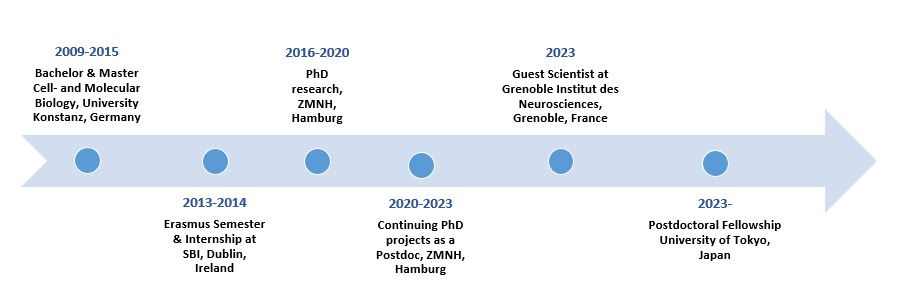Meet-the-Alumna | Anja Konieztny A10 Postdoc
Name: Anja Konietzny
Currently at: Center for Molecular Neurobiology Hamburg (ZMNH)
Position: Postdoc
Graduated: March 2020
Degrees: Dr. rer. Nat.
Graduate studies: Molecular Neurobiology

Tell us about yourself. What do you currently do?
I completed my PhD in March 2020 (on the very day before our university went into Covid lockdown), in the lab of Prof. Marina Mikhaylova, who is now leading the research group “Optobiology” at the HU Berlin. My plans to go abroad for a postdoc fellowship were cut short by Covid, and I was very lucky and am still very grateful that Marina was able to offer me a contract to stay in her lab as a postdoc. I continued working on two projects that I had started during my PhD, concerning specializations of the endoplasmic reticulum at post-synaptic sites, and the interplay of microtubule post-translational modifications with the trafficking of axonal cargo vesicles. Additionally I became involved with the SFB1315 project “A10”, in which we aim to identify mRNA in the distal dendrites of cortical layer 5 neurons, and investigate to what extent local protein synthesis plays a role in neocortical memory consolidation.
How did your work in the lab of A10 help in your career(s) after graduation?
Purely on a practical level, through my involvement with the A10 project I was not only able to learn a bunch of new hands-on experimental techniques (mainly involving RNA sequencing and the non-trivial analysis of RNAseq results), but through participating in a SFB1315 retreat and through collaborating with other SFB1315 labs, especially with C01, I got to know many new cutting-edge technologies and molecular tools that I didn’t really know existed before, which has definitely broadened my horizon on “what is possible” experimentally. Additionally, being involved in the SFB1315 gave me the opportunity to participate in a neuroscience conference in Singapore, which was an invaluable opportunity to share our ongoing work with the community and to make new connections in the Asian-Pacific region (which I will be moving to soon).
How did you conduct your job search after leaving A10?
I zeroed in on some specific research questions that I would like to answer, and searched for laboratories that were working on similar topics and that had the means and the equipment to tackle such questions. I then wrote to the principal investigators with initial proposals for research projects, and when I got a positive answer from one of them I fleshed out the project and wrote several grant applications for funding (and luckily one of them got accepted 😉
What advice would you give undergraduate students in neuroscience?
If you want to stay in academia:
Be aware that many scholarship agencies require up to a year of processing time for your application… I know it is very difficult to look one year into the future, especially during your undergrad when you’re swamped with course work, but inform yourself on funding / scholarship opportunities well before you graduate and keep an eye out for deadlines. This is a good question to ask your mentors, as they will probably have a better overview over what opportunities exist out there.
Go to as many conferences as you can and build networks with other researchers. I found that academic Twitter helps with keeping connections 😉
Be aware what people in your neighboring labs / your institute / your city are working on, and be open for collaborations, asking for help, or offering it.
Try to visit other labs and learn new / specialized techniques from them. Many PhD programs contain funding for exactly such occasions, and if not you can apply for short-term exchange fellowships.
How important do you think mentoring was and is for your career development, and would you be willing to mentor a student in our consortium?
Being the first person from my family to pursue an academic career, mentoring from my colleagues / superiors was invaluable for me to navigate the bureaucratic jungle of academia (although is still is a challenge to this day…). Don’t be afraid to reach out and ask for help from your peers / mentors, even if you feel like your questions are super basic (and maybe especially then).
Contact Marylu to get in touch with Anja

